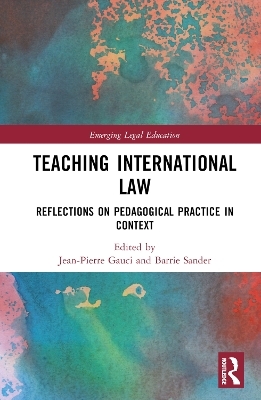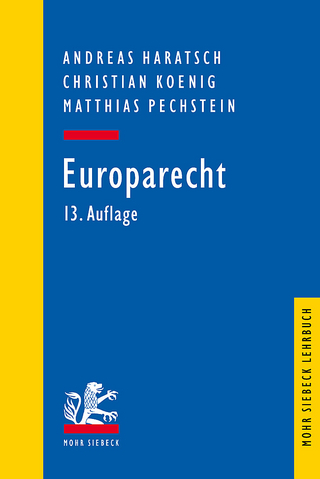
Teaching International Law
Routledge (Verlag)
978-1-032-55151-7 (ISBN)
The practice of teaching international law is conducted in a wide range of contexts across the world by a host of different actors – including scholars, practitioners, civil society groups, governments, and international organisations.
This collection brings together a diversity of scholars and practitioners to share their experiences and critically reflect on current practices of teaching international law across different contexts, traditions, and perspectives to develop existing conversations and spark fresh ones concerning teaching practices within the field of international law. Reflecting on the responsibilities of teachers of international law to engage with and confront histories, contemporary crises, and everyday events in their teaching, the collection explores efforts to decenter the teacher and the law in the classroom, opportunities for dialogical and critical approaches to teaching, and the possibilities of co-producing non-conventional pedagogies that question the mainstream underpinnings of international law teaching. Focusing on the tools and techniques used to teach international law to date, the collection examines the teaching of international law in different contexts. Traversing a range of domestic and regional contexts around the world, the book offers insights into both the culture of teaching in particular domestic settings, aswell as the structural challenges and obstacles that arise in terms of who, what, and how international law is taught in practice.
Offering a unique window into the personal experiences of a diversity of scholars and practitioners from around the world, this collection aims to nurture conversations about the responsibilities, approaches, opportunities, and challenges of teaching international law.
Jean-Pierre Gauci is Arthur Watts Senior Research Fellow in Public International Law and Director of Teaching and Training at BIICL. He holds a PhD in Law from King's College London and a Doctor of Laws and Magister Juris in International Law from the University of Malta. Jean-Pierre is also co-founder and co-director of The People for Change Foundation, a human rights think tank based in Malta; a consultant to international and national governmental and non-governmental organizations; and a lecturer in International Migration law and Ocean governance at the University of Malta. His primary areas of work include: migration and refugee law, human trafficking law and policy, and international labour law. Barrie Sander is Assistant Professor of International Justice at the Faculty of Governance and Global Affairs, Leiden University, where he teaches at Leiden University College The Hague. His research interests include international criminal law, international human rights law, and the intersection of digital technology and international law. He is the author of Doing Justice to History: Confronting the Past in International Criminal Courts (OUP 2021), based on his PhD thesis, which was awarded the Graduate Institute of International and Development Studies Alumni Association Prize 2021. He has also published in a wide range of international law journals, including European Journal of International Law, London Review of International Law, and Leiden Journal of International Law, and was awarded the Young Scholar Prize 2018 by International and Comparative Law Quarterly.
1. Introduction: Teaching International Law - Reflections on Pedagogical Practice in Context
Part I: Reflexivity
2. Apathy, Aphasia & Athambia: Teaching Jamestown and Parodying the History of International Law
3. Teaching International Criminal Law from a Critical Perspective: Decentering the Law and the Teacher
4. A ‘Global South/Third World’ Perspective on International Law Teaching
5. Teaching and (Un)learning International Law in Qatar
6. Cultural Interactions with the Pedagogy of International Law: Challenges and Opportunities
7. Humanising the Teaching of International Law
8. Reflections on Teaching ‘Emotion Bites’ in an LLM Course on Human Rights and Conflict Resolution
Part II: Tools and Techniques
9. From Podcast to Utopia: Hope and Doubt Behind Knowledge Production in International Legal Academia
10. The Dynamics of Writing and the ‘Good’ International Law Textbook
11. Reading Groups on International Law: The Role of Co-Creation in Decolonising the Curriculum
12. Decolonising the Teaching of International Humanitarian Law
13. Interdisciplinary Simulations as Innovative Teaching Formats – Experiences from an International Law Classroom
14. Teaching Law of Armed Conflict with Virtual Reality
15. Teaching International Humanitarian Law in Crisis
Part III: Contexts
16. “Teacher, Don’t Teach Me Nonsense!”: A Personal Reflection on Teaching International Law in Nigeria
17. International Law in the Middle East: A Pedagogy of Critical Absences
18. Between History and Pedagogy: Teaching the Philippine National Territorial Imaginary – its ‘Geo-Body’ – After the 2016 South China Sea Arbitral Award
19. Teaching Public International Law in Brazil and the Unintended Impact of the Bar Exam
20. Teaching Future Military Commanders International Humanitarian Law
21. Teaching to Wuhan in the Time of Corona
22. Teaching International Law through the Prism of Global Events
Part IV: Specialised Areas
23. The Migration Law Programme: Inspiration for Teaching of International Law
24. Teaching and Learning International Climate Change Law
25. The Irrelevance and Coloniality of International Economic Law: How African Teachers Must Drum Them Away
26. The Gender of International Human Rights Law? Uncovering Legal Academics’ Views on Teaching Women’s Rights
27. Connecting Transnational and International Criminal Law in the Classroom
28. Should Militaries Teach International Humanitarian Law and Ethics Together? Comparing the Attitudes of Educators Internationally
29. Subject or Skill? Teaching (and Learning) International Law as an International Relations Scholar
| Erscheinungsdatum | 10.07.2024 |
|---|---|
| Reihe/Serie | Emerging Legal Education |
| Zusatzinfo | 2 Tables, black and white; 2 Halftones, black and white; 2 Illustrations, black and white |
| Verlagsort | London |
| Sprache | englisch |
| Maße | 156 x 234 mm |
| Gewicht | 940 g |
| Themenwelt | Recht / Steuern ► Allgemeines / Lexika |
| Recht / Steuern ► EU / Internationales Recht | |
| Sozialwissenschaften ► Pädagogik ► Erwachsenenbildung | |
| ISBN-10 | 1-032-55151-8 / 1032551518 |
| ISBN-13 | 978-1-032-55151-7 / 9781032551517 |
| Zustand | Neuware |
| Informationen gemäß Produktsicherheitsverordnung (GPSR) | |
| Haben Sie eine Frage zum Produkt? |
aus dem Bereich


